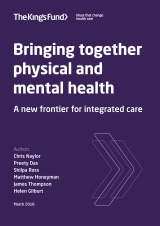Integrated care has been a key policy aspiration yet until now, most efforts to promote integration have focused on bridging gaps between health and social care and between primary and secondary care.
The gap between mental health and physical health presents a third dimension of integration and one that the King’s Fund report ‘Bringing together physical and mental health’ directly addresses.
And so it was this topic that formed the focus of the recent joint event between the All-Party Parliamentary Health Group and The King’s Fund, chaired by Baroness Walmsley, a Co-Chair of the Group. Opening the event, report author Chris Naylor dispelled any expectations that this was about parity of esteem, with the key message that integration moves the agenda from mental health being as good as physical health, to a greater goal of delivering mental and physical health care as part of a whole person approach. This certainly reflects the experiences of people living with physical and mental health conditions captured in the report. One participant noted an opening question of ‘how are your HbA1c levels looking?’ can quickly close down discussion on psychological wellbeing whereas a question about ‘how are you coping?’ opens it up. Delivering integrated care is as much about getting the basics right and developing a holistic approach to clinical practice as it is about joining up systems and services.
Professor Jane Dacre, President of the Royal College of Practitioners, however left no doubt about the challenge of doing this. Describing her role as a consultant rheumatologist through three patient stories, it is clear that although many clinicians recognise the impact of mental health issues, their training often leaves them ill-equipped to address them; time constraints limit their ability to go beyond the condition at hand; and there is often little support to manage the behaviours of patients or access to such support more widely. This mind-body divide works both ways, as Sir Simon Wessely, President of the Royal College of Psychiatrists, illustrated through a picture of a main road in south east London, with the mental health Trust firmly on one side of the road and the acute Trust on the other, with only traffic lights to link them.
That situation is gradually changing and there have been inroads to join the divide.
As The King’s Fund reports highlights, bridging those boundaries takes leadership but that that leadership can come from both sides. The 3 Dimensions for Diabetes programme is one of those examples bringing psychological support into the clinic to engage those with multiple needs, while Oxford’s psychological medicine service demonstrates how acute sector-led initiatives can help make psychological care a core part of their provision, and change the culture of care as part of the process.
The ever present financial challenge facing the NHS makes the impetus to drive change at scale and pace increasingly important. As Paul Farmer, CEO of Mind and joint lead commissioner on the NHS England Mental Health Taskforce report noted, an estimated £1.8 billion of costs incurred in the treatment of diabetes can be attributed to mental health needs, but less than 15% get access to appropriate support. Furthermore, he highlighted that many of the physical health issues which impact on the premature mortality of people with severe mental health problems, such as smoking and physical activity a,re well documented and do not represent complex issues to address. Implementation of the taskforce recommendations present an opportunity to put this right, a task that now falls on the new National Clinical Director for Mental Health, Tim Kendall. Responding from the floor, he offered his vision of a proper needs-led health service for the future which certainly embodies the ethos of integrated care, leaving the room with high expectations for progress in the coming months.




